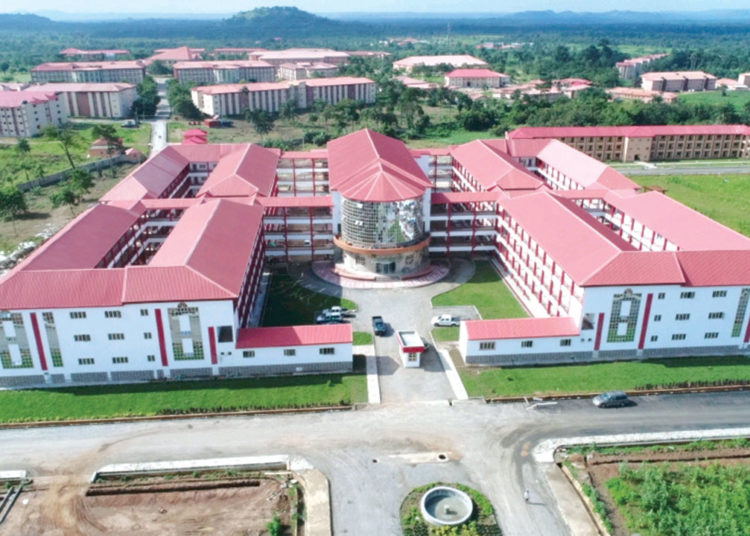More than anything else, the latest global ranking of universities has further underscored the need to accord top most priority to Nigerian universities specifically and the education sector in general. According to the Times Higher Education Impact Rankings, the best university in Nigeria, Afe Babalola University Ado-Ekiti, (ABUAD) ranks 400th. Well accepted globally, the Times ranking looks at indicators that measure an institution’s performance across teaching, research, knowledge transfer and international outlook.
It is on record that the World University Rankings 2022 covered more than 1,600 universities across 99 countries and territories. The ranking analysed more than 108 million citations across over 14.4 million research publications and included survey responses from almost 22,000 scholars globally.
No African country made it to the top 100 universities in the ranking. The best-ranked University in the continent, according to the report, is South Africa’s University of Cape Town, at 183rd position. In Nigeria, our prestigious universities of Ibadan and Lagos ranked 401st and 501 respectively.
While we join Nigerians to congratulate ABUAD over this feat, we note that it says a lot about the deplorable state of education in Nigeria. In spite of its strategic importance in driving the current knowledge-based economy, successive administrations in Nigeria have relegated education to the background with budgetary allocation to the sector paltry at best.
A review of the budgetary allocation to this all-important sector by the 36 states of the federation, all of which own at least one university each, showed appalling statistics. While the United Nations Educational, Scientific and Cultural Organisation’s (UNESCO) convention recommended 25 percent to the sector, Nigeria still has not achieved 15 per cent allocation.
In the 2022 budget of the Nigerian government, the education sector got N1.29 trillion representing 7.9 per cent of the total budget. This clearly is less than 10 per cent even though UNESCO recommended that developing nations should give up to 25 per cent of their annual budget to public education.
Fundamentally, we recall that of the N55.3trillion budgeted by the President Buhari led federal government in the last six years, only N3.5 trillion was allocated to education and this represents less than 10 per cent, suggesting clearly that education is not the administration’s priority.
Sadly, in our view, the education sector has been deprived of adequate funding with dearth of infrastructure, poor welfare, inadequate staffing being part of the challenges impeding the sector and hampering effective learning across primary, secondary and tertiary institutions.
For most experts in the sector, that Nigerian universities ranked so low should not have come as a surprise. Consistently, teaching and research are often interrupted by prolonged Academic Staff Union of Universities-ASUU-strikes? For more than four months now, the universities are not in session because of yet another strike by the lecturers’ union. What this means is that the universities being assessed are not even in session.
These recurring strikes by the university lecturers are not totally unjustified because infrastructure in most public sector-owned universities is in a deplorable state. The Tertiary Education Trust Fund-TETFund-is making some modest intervention, but clearly, it is not enough to tackle in an effective manner the rot in the system.
The impact of the long years of neglect and lip service accorded the education sector is visible for all to see. The quality of graduates churned out annually by these universities leaves much to be desired. They are utterly unemployable because of poor training. The right word, as has often been used unchallenged, is that our graduates are half-baked.
But then of course, it is clear that the universities cannot perform beyond their capacity. Deprived of the needed funding for teaching and research, lecturers make do with what is available, at times, embarking on strikes to press home their demands and the result is what international disinterested assessors put before the rest of the world about the tertiary institution the country runs and owns.
Under the present administration alone, undergraduates in universities across the country have lost not less than 13 months from their educational calendar, owing to the recurring strike by the Academic Staff Union of Universities (ASUU). The latest ongoing strike by ASUU began on February 14, 2022 to demand for better conditions of service as contained in the agreement it reached with the government in 2009. It is still ongoing.
Tellingly, in our considered opinion, all of these factors contribute immensely to the worsening state of education in the country and make the universities rank abysmally low because their capacity to optimally perform in teaching and research have been impeded.
In our opinion, we urge the authorities to see the latest ranking as a wake up call on the urgency of turning things around so as to salvage what is left of the sector. The time to embark on that mission is now.





